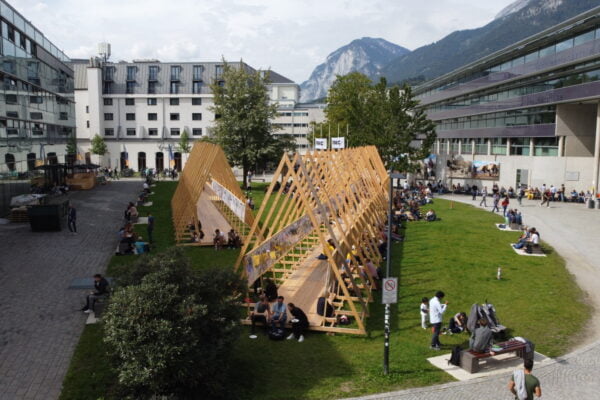
NAME:
SOWI - Garden
BUILDING:
SOWI
FLOOR:
0
TYPE:
Garden
CAPACITY:
2000
ACCESS:
Public Access
EQUIPMENT:
---
Mountain regions have preserved a large number of commons managed by collective organisations known as bourgeoisies in Switzerland and jemaa in Morocco. These commons (pastures, forests, irrigation networks, mills) were essential to the survival of the group and enabled communities to manage complex resources that were subject to seasonal and inter-annual hazards depending on climatic fluctuations. Today, they are being reinvented in a context of diaspora around emblematic animals and plants. Since the second half of the 20th century, in many mountain communities, farming has become financially secondary to other economic opportunities. The majority of those with rights to common land now have professional activities in major cities, sometimes several hundred or even thousands of kilometres away from their original territory. However, land commonholdings have not systematically disappeared, as they embody a deep-rooted link with the land. In the Val d’Anniviers in Switzerland, for example, the collective cowsheds set up in the 1960s enable entitled farmers to keep a few cows and take part in the alpine pasture and queen competitions. In this way, they support the last ‘real farmers’. In Morocco, in the Anti-Atlas, those with rights who have settled in the major Moroccan and European cities are involved in the collective planting of fruit trees (argan trees, olive trees, almond trees). They include new joint public projects run by ministries and development agencies for the benefit of local women’s cooperatives producing local produce. Comparative analysis allows us to rethink the human-non-human relationship that is at play in mountain areas around common goods. Thanks to these new multi-species commons, diaspora right-holders maintain a strong link with their homeland. The animals and plants allow them to remain rooted despite their distance, and also to remain a player in local territorial development according to principles linking solidarity, development and preservation of the environment.

We and use cookies and other tracking technologies to improve your experience on our website. We may store and/or access information on a device and process personal data, such as your IP address and browsing data, for personalised advertising and content, advertising and content measurement, audience research and services development. Additionally, we may utilize precise geolocation data and identification through device scanning.
Please note that your consent will be valid across all our subdomains. You can change or withdraw your consent at any time by clicking the “Consent Preferences” button at the bottom of your screen. We respect your choices and are committed to providing you with a transparent and secure browsing experience.